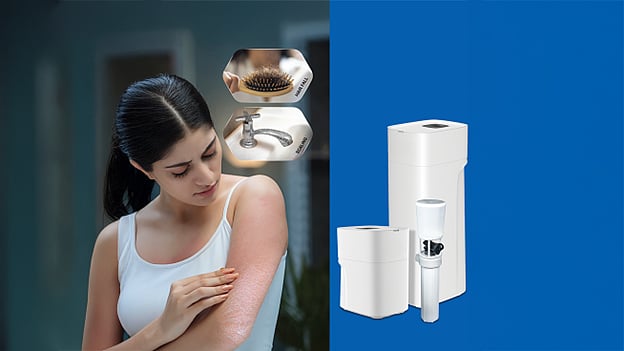5 Common Myths About Water Softeners That You Need To Know
Modern water softeners are designed to be compact, quiet, and energy efficient.

advertisement
Hard water affects many households, leaving white stains on fixtures, causing hair to look dull, skin to look rough, reducing soap lather, and lowering the efficiency of appliances like geysers, washing machines, and dishwashers. It can also lead to limescale buildup in pipes, increase energy consumption, and shorten the lifespan of home appliances. Despite its widespread impact, several misconceptions about water softeners for the home prevent people from adopting this simple and effective solution.
Debunking water softener myths
Understanding the truth behind these myths can help you make an informed decision and enjoy softer water throughout your home.
1. Water softeners are too expensive and not worth the investment
One of the most common misconceptions is that water softeners are a luxury rather than a necessity. Advanced hard water softeners for the home are cost-effective in the long run. By converting hard water into soft water, they help prevent scale build-up in pipes, reduce detergent usage, and indirectly extend the lifespan of appliances like water heaters, washing machines, and geysers, leading to lower maintenance and energy costs. Over time, the investment delivers value through easier cleaning, reduced maintenance, and softer water that’s gentler on your skin, hair, and household appliances.
2. Water softeners are only for bathrooms
Many people think water softeners are only needed for bathing, but their benefits extend to the entire household. A water softener can be installed at the main water inlet (entry point), ensuring that every tap in the bathroom receives softened water. Softer water improves laundry results, reduces soap scum in kitchens, and prevents limescale in appliances. If you’re looking for a focused solution, bathroom water softeners are also available. These compact units connect directly to showers or faucets, converting hard water to soft water for bathing, giving you healthier skin and hair without requiring a full-house system.
3. Water softeners are noisy and take up too much space
Older models of water softeners were often bulky and noisy, contributing to the myth that they’re troublesome. Modern water softeners are designed to be compact, quiet, and energy efficient. Whether you need a hard water softener for home or a specialised unit for the bathroom, modern designs ensure seamless integration into your household without compromising on space or convenience.
4. Only homes with extremely hard water need a softener
Hard water can affect skin, hair, and household appliances over time. Waiting until water becomes extremely hard before installing a water softener can result in unnecessary damage and higher maintenance costs. Using a water softener for hair, skin, laundry, and other uses ensures daily comfort and long-term protection for your home’s plumbing and appliances, regardless of water hardness level.
5. Water softeners require constant maintenance
Another common misconception is that a water softener for a home tank demands frequent, time-consuming upkeep. In reality, modern water softening systems are built for convenience, featuring automatic regeneration cycles, smart salt level management, and easy-to-clean units. Automatic regeneration is a process that flushes out the accumulated minerals from the resin bed and recharges it with ions, ensuring the system continues to convert hard water into soft water efficiently. This process runs automatically based on water usage or time intervals, eliminating the need for manual intervention. With proper installation and routine checks, these systems can operate efficiently for years, delivering consistent soft water without requiring constant attention.
Summing up
Water softeners are more than just an optional household appliance; they deliver practical, long-term benefits across your home. From bathroom units to full-house systems, modern water softeners are compact, quiet, and efficient, helping protect appliances, improve water quality, and enhance daily comfort.
When searching for a reliable and effective water softener for the home, Aquaguard offers some of the best solutions, featuring advanced IntelliMix Technology, automated regeneration cycles, and high-quality softening media. These systems ensure consistently soft water for your taps, bathroom, and home tank, allowing your family to fully experience the benefits of reduced water hardness.